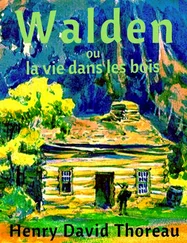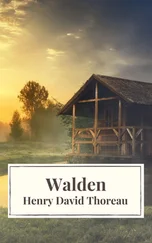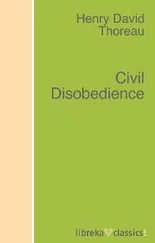It is remarkable how many creatures live wild and free though secret in the woods, and still sustain themselves in the neighborhood of towns, suspected by hunters only. How retired the otter manages to live here! He grows to be four feet long, as big as a small boy, perhaps without any human being getting a glimpse of him. I formerly saw the raccoon in the woods behind where my house is built, and probably still heard their whinnering at night. Commonly I rested an hour or two in the shade at noon, after planting, and ate my lunch, and read a little by a spring which was the source of a swamp and of a brook, oozing from under Brister’s Hill, half a mile from my field. The approach to this was through a succession of descending grassy hollows, full of young pitch pines, into a larger wood about the swamp. There, in a very secluded and shaded spot, under a spreading white pine, there was yet a clean, firm sward to sit on. I had dug out the spring and made a well of clear gray water, where I could dip up a pailful without roiling it, and thither I went for this purpose almost every day in midsummer, when the pond was warmest. Thither, too, the woodcock led her brood, to probe the mud for worms, flying but a foot above them down the bank, while they ran in a troop beneath; but at last, spying me, she would leave her young and circle round and round me, nearer and nearer till within four or five feet, pretending broken wings and legs, to attract my attention, and get off her young, who would already have taken up their march, with faint, wiry peep, single file through the swamp, as she directed. Or I heard the peep of the young when I could not see the parent bird. There too the turtle doves sat over the spring, or fluttered from bough to bough of the soft white pines over my head; or the red squirrel, coursing down the nearest bough, was particularly familiar and inquisitive. You only need sit still long enough in some attractive spot in the woods that all its inhabitants may exhibit themselves to you by turns.
I was witness to events of a less peaceful character. One day when I went out to my wood-pile, or rather my pile of stumps, I observed two large ants, the one red, the other much larger, nearly half an inch long, and black, fiercely contending with one another. Having once got hold they never let go, but struggled and wrestled and rolled on the chips incessantly. Looking farther, I was surprised to find that the chips were covered with such combatants, that it was not a duellum, but a bellum, a war between two races of ants, the red always pitted against the black, and frequently two red ones to one black. The legions of these Myrmidons covered all the hills and vales in my wood-yard, and the ground was already strewn with the dead and dying, both red and black. It was the only battle which I have ever witnessed, the only battle-field I ever trod while the battle was raging; internecine war; the red republicans on the one hand, and the black imperialists on the other. On every side they were engaged in deadly combat, yet without any noise that I could hear, and human soldiers never fought so resolutely. I watched a couple that were fast locked in each other’s embraces, in a little sunny valley amid the chips, now at noonday prepared to fight till the sun went down, or life went out. The smaller red champion had fastened himself like a vice to his adversary’s front, and through all the tumblings on that field never for an instant ceased to gnaw at one of his feelers near the root, having already caused the other to go by the board; while the stronger black one dashed him from side to side, and, as I saw on looking nearer, had already divested him of several of his members. They fought with more pertinacity than bulldogs. Neither manifested the least disposition to retreat. It was evident that their battle-cry was “Conquer or die.” In the meanwhile there came along a single red ant on the hillside of this valley, evidently full of excitement, who either had despatched his foe, or had not yet taken part in the battle; probably the latter, for he had lost none of his limbs; whose mother had charged him to return with his shield or upon it. Or perchance he was some Achilles, who had nourished his wrath apart, and had now come to avenge or rescue his Patroclus. He saw this unequal combat from afar — for the blacks were nearly twice the size of the red — he drew near with rapid pace till be stood on his guard within half an inch of the combatants; then, watching his opportunity, he sprang upon the black warrior, and commenced his operations near the root of his right fore leg, leaving the foe to select among his own members; and so there were three united for life, as if a new kind of attraction had been invented which put all other locks and cements to shame. I should not have wondered by this time to find that they had their respective musical bands stationed on some eminent chip, and playing their national airs the while, to excite the slow and cheer the dying combatants. I was myself excited somewhat even as if they had been men. The more you think of it, the less the difference. And certainly there is not the fight recorded in Concord history, at least, if in the history of America, that will bear a moment’s comparison with this, whether for the numbers engaged in it, or for the patriotism and heroism displayed. For numbers and for carnage it was an Austerlitz or Dresden. Concord Fight! Two killed on the patriots’ side, and Luther Blanchard wounded! Why here every ant was a Buttrick — “Fire! for God’s sake fire!” — and thousands shared the fate of Davis and Hosmer. There was not one hireling there. I have no doubt that it was a principle they fought for, as much as our ancestors, and not to avoid a three-penny tax on their tea; and the results of this battle will be as important and memorable to those whom it concerns as those of the battle of Bunker Hill, at least.
I took up the chip on which the three I have particularly described were struggling, carried it into my house, and placed it under a tumbler on my window-sill, in order to see the issue. Holding a microscope to the first-mentioned red ant, I saw that, though he was assiduously gnawing at the near fore leg of his enemy, having severed his remaining feeler, his own breast was all torn away, exposing what vitals he had there to the jaws of the black warrior, whose breastplate was apparently too thick for him to pierce; and the dark carbuncles of the sufferer’s eyes shone with ferocity such as war only could excite. They struggled half an hour longer under the tumbler, and when I looked again the black soldier had severed the heads of his foes from their bodies, and the still living heads were hanging on either side of him like ghastly trophies at his saddle-bow, still apparently as firmly fastened as ever, and he was endeavoring with feeble struggles, being without feelers and with only the remnant of a leg, and I know not how many other wounds, to divest himself of them; which at length, after half an hour more, he accomplished. I raised the glass, and he went off over the window-sill in that crippled state. Whether he finally survived that combat, and spent the remainder of his days in some Hotel des Invalides, I do not know; but I thought that his industry would not be worth much thereafter. I never learned which party was victorious, nor the cause of the war; but I felt for the rest of that day as if I had had my feelings excited and harrowed by witnessing the struggle, the ferocity and carnage, of a human battle before my door.
Kirby and Spence tell us that the battles of ants have long been celebrated and the date of them recorded, though they say that Huber is the only modern author who appears to have witnessed them. “AEneas Sylvius,” say they, “after giving a very circumstantial account of one contested with great obstinacy by a great and small species on the trunk of a pear tree,” adds that “this action was fought in the pontificate of Eugenius the Fourth, in the presence of Nicholas Pistoriensis, an eminent lawyer, who related the whole, history of the battle with the greatest fidelity.” A similar engagement between great and small ants is recorded by Olaus Magnus, in which the small ones, being victorious, are said to have buried the bodies of their own soldiers, but left those of their giant enemies a prey to the birds. This event happened previous to the expulsion of the tyrant Christiern the Second from Sweden.” The battle which I witnessed took place in the Presidency of Polk, five years before the passage of Webster’s Fugitive–Slave Bill.
Читать дальше












